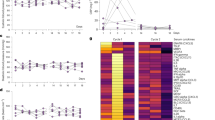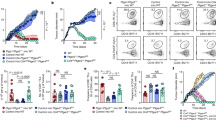Abstract
THE mechanism whereby thymus-derived (T) and bone marrow or bursa-derived (B) lymphocytes cooperate in the induction of an antibody response is of great importance in immunology. It has been suggested that T cells concentrate antigen by their surface receptors to present a multideterminant antigen array directly to B cells1,2; or that T cells secrete a special class of cooperating antibody (IgX) for this purpose, which could specifically present antigen at the surface of a third cell, the macrophage3,4; or that the product of recognition of antigen by T cells has some non-specific mitogenic or stimulatory effect on B cells5,6. Recent work with in vitro systems has indicated that various factors produced by T cells, either after contact with a specific antigen or following stimulation by allogeneic cells, can replace the requirement for T cells in antibody formation7–14.
This is a preview of subscription content, access via your institution
Access options
Subscribe to this journal
Receive 51 print issues and online access
$199.00 per year
only $3.90 per issue
Buy this article
- Purchase on Springer Link
- Instant access to full article PDF
Prices may be subject to local taxes which are calculated during checkout
Similar content being viewed by others
References
Mitchison, N. A. in Immunological Tolerance (edit. by Landy, M. and Braun, W.) 115 (Academic, London and New York, 1969).
Mitchison, N. A., Rajewsky, K., and Taylor, R. B., in Developmental Aspects of Antibody Formation and Structure (edit. by Sterzl, J. and Riha, I.) 547 (Academic, London and New York, 1970).
Taussig, M. J., and Lachmann, P. J., Immunology, 22, 185 (1972).
Feldmann, M., and Nossal, G. J. V., Transpln. Rev., 13, 3 (1972).
Katz, D. H., and Benacerraf, B., Adv. Immun., 15, 2 (1972).
Kreth, H. W., and Williamson, A. R., Nature, 234, 454 (1971).
Feldmann, M., and Basten, A., Nature new Biol., 237, 13 (1972).
Schimpl, A., and Wecker, E., Nature new Biol., 237, 15 (1972).
Ekpaha-Mensah, A., and Kennedy, J. C., Nature new Biol., 233, 174 (1971).
Dutton, R. W., Falkoff, R., Hirst, J. A., Hoffmann, M., Kappler, J. W., Kettman, J. R., Lesley, J. F., and Vann, D., in Progress in Immunology (edit. by Amos, B.) 355 (Academic, London and New York, 1971).
Gorczynski, R. M., Miller, R. G., and Phillips, R. A., J. Immun., 110, 968 (1973).
Britton, S., Scand. J. Immun., 1, 89 (1972).
Katz, D. H., Transpln. Rev., 12, 141 (1972).
Waldmann, H., and Munro, A., Nature, 243, 356 (1973).
Von Boehmer, H., and Shortman, K., J. Immun. Meth., 2, 293 (1973).
Möller, G., Cell. Immun., 1, 573 (1970).
Coutinho, A., and Möller, G., Nature new Biol., 245, 12 (1973).
Author information
Authors and Affiliations
Rights and permissions
About this article
Cite this article
TAUSSIG, M. T cell factor which can replace T cells in vivo. Nature 248, 234–236 (1974). https://doi.org/10.1038/248234a0
Received:
Revised:
Issue Date:
DOI: https://doi.org/10.1038/248234a0
Comments
By submitting a comment you agree to abide by our Terms and Community Guidelines. If you find something abusive or that does not comply with our terms or guidelines please flag it as inappropriate.



